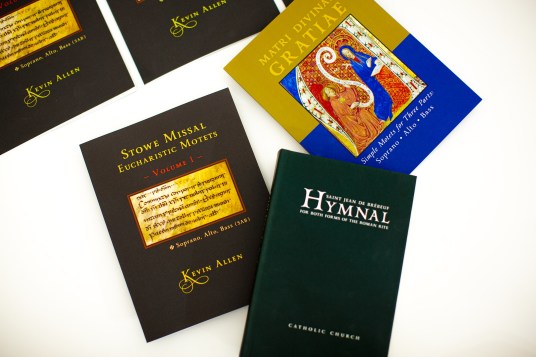![]()
 URING THIS SUMMER’S spectacular church music Symposium, there was a panel discussion. Each faculty member recommended an indispensable piece of choral music for those who direct volunteer choirs. Jeff Ostrowski recommended Kevin Allen’s Matri Divinæ Collection—written for SAB choir—declaring: “These pristine pieces are absolute gold. They have the Solfège markings already written in, they’re fresh and fun, and (especially if your singers have varying degrees of experience) you should start with these at the beginning of every season!”
URING THIS SUMMER’S spectacular church music Symposium, there was a panel discussion. Each faculty member recommended an indispensable piece of choral music for those who direct volunteer choirs. Jeff Ostrowski recommended Kevin Allen’s Matri Divinæ Collection—written for SAB choir—declaring: “These pristine pieces are absolute gold. They have the Solfège markings already written in, they’re fresh and fun, and (especially if your singers have varying degrees of experience) you should start with these at the beginning of every season!”
Stowe Missal Motets: Composer Kevin Allen has just released another collection which is quite similar to Matri Divinæ. That’s because: (1) They’re for three voices (Soprano, Alto, Bass); (2) They have the Solfège already written in; (3) They are modern and fresh; and (4) They include additional psalm-tones to match perfectly the liturgical action happening at the Altar:
* Amazon • “Stowe Missal Eucharistic Motets” (SAB)
—Sold by Amazon (all proceeds go directly to the composer).
Provenance Of These Texts: It is not known when the famous STOWE MISSAL was created. In the Catholic Encyclopedia, Father Adrian Fortescue dates it around 615AD, but some scholars think it may have been earlier (while others suggest its genesis came later). Around 1200AD, frequent reception of Holy Communion by the faithful became rare, but the STOWE MISSAL contains the texts of various songs to be sung during the distribution of Holy Communion.
![]()
Sample Score: Those who wish to do so may download a Stowe Missal Motet Sample Score. To share a video recording with your friends—which helps spread the word about serious Catholic composers such as Mr. Allen—please click here.
Rehearsal Videos: Jeff Ostrowski, in an effort to assist volunteer choirs, has already recorded practice videos for one of these majestic motets (“Commíxtio Córporis”). These free rehearsal videos for each individual voice await you at #53338.
Completely New: The “Stowe Missal Eucharistic Motets” were commissioned by Corpus Christi Watershed in honor of the USCCB’s declared National Eucharistic Revival, which began on 19 June 2022. They were premiered at Sacred Music Symposium 2022:

Photographs:
![]()
![]()
![]()
![]()
![]()
![]()
![]()
![]()
![]()
![]()

Kevin Allen: Kevin Allen has been highly regarded as a composer of opera, chamber, and orchestral music. Mr. Allen has also developed a unique reputation as a composer of church music for the Roman Rite. Mr. Allen’s works—both sacred and secular—have been performed in churches and concert halls throughout the world. Mr. Allen is the founding director of the Collins Consort, the American Composer’s Project, and the Schola Immaculata. He directs music at the Monastery of the Holy Cross in Chicago.
![]()






















